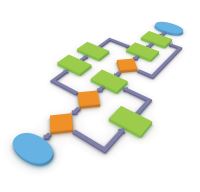Why Automate? (Building a case for Automation)
What are the challenges you typically face in your line of work?
- Streamlining existing operations
- Increasing productivity through increased efficiency
- Restructuring your accounting practices to ensure organized finances
- Improving accuracy across your financials within existing resources and means
Do these sound familiar?
If you thought “automation” applied primarily to mass-produced products, think again. Automation conserves enormous amounts of time, especially with regard to time and labor intensive functions such as financial and accounting operations. It also improves accuracy and reliability for tasks such as balancing your books, reconciling bank accounts on a regular basis, and recording daily invoices and other transactions. Automation allows for timely, systematic completion of these functions and significantly reduces errors associated with manual data entry work.
Automating your accounting and bookkeeping practices results in streamlined financials. Smarter financials serve as an example of your dedication to economic efficiency, without sacrificing quality or a commitment to structured and managed business growth.
However, smart financials are not just a result of automation. Your business also requires seamless integration of operational systems and controls along with accounting and bookkeeping. Without this integration, your business is vulnerable to financial losses due to errors. As accounting functions can be time intensive, automation and integration help improve operational efficiency, processing accounting functions quickly and without errors.
Selecting a comprehensive, integrated accounting system provides benefits beyond just “better accounting”, such as in-depth reporting capabilities. An additional benefit is the ability to create real-time online reporting that is populated with data imported on a regular, systematic basis. Lastly, by reducing the amount of manual processes associated with the accounting processes, many typical errors in the financial statement compilation process may be eliminated, assuring readers of the financial statements’ validity.
 The Typical Automation Process for a small-sized business
The Typical Automation Process for a small-sized business
For any automated accounting system implementation, the needs of the business should be considered central to the automation process. Typically, even with the most robust “off the shelf” solutions, some level of customization must occur to make the accounting system completely compatible with the needs of the business.
Identifying processes for automation
A good starting point is identifying the processes which require automation. Are you a business dealing in services or do you also manufacture or market products? Do you need to compile basic accounting requirements, such as bank account reconciliations or liabilities snapshots (accounts payable)? Do you have to deal with large inventories?
The Request for Proposal
A Request for Proposal (RFP) is imperative to sourcing an effective vendor. Ensure you create an RFP that allows you to assess the qualifications of those bidding on the project. Your vendor should provide a list of capabilities that align with your business needs. Do you need a solution or service specific to your niche? A vendor familiar with your industry or niche can offer you guidance on best practices and ways of customizing the system to your needs, based on their expertise.
Enlisting Vendors
The process provided by the vendor ideally will be developed around your needs. For example, if you require a reporting platform that integrates inventory needs, invoicing and debt management, but the vendor does not provide these, then it will not work for you.
Factoring in the Cost
Calculating costs and conducting a Cost Benefit Analysis are vital steps to automation.
The scope of your automation project needs significantly impacts cost. Integrating and automating accounting functions across the business will be more expensive than integrating and automating a few, simple accounting functions. A reliable vendor can guide you in what areas are most in need of automation, and they can provide you with an estimate on what it will take to complete various scenarios.
Implementation
A good vendor will not simply implement a plan of action; they will thoroughly test the proposed solution first and have the results reviewed by both professionals and the client.
Accounts payable: Check for automated closings of entries and reconciliations of bank statements. Automation can provide an accurate picture of your liabilities and help prevent defaults. By itself, efficient automation significantly should reduce the dependence on manual data entry and the amount of data errors.
KPI reports: For any business, regardless of size, periodic performance reviews are critical to being able to set goals and KPIs to eventually raise the productivity bar. Ideally, your vendor should provide you with KPI reporting capabilities, as well. Reports on Key Performance Indicators (or KPIs) can provide a snapshot of how your business is operating.
In summary, when implementing an automated accounting systems integration, keep in mind the following characteristics, as a good vendor will help you:
- Consolidate your accounting info
- Provide improved cash flow management
- Help you reduce overheads
- Help your store improve its productivity and, eventually, profitability
Analytix Solutions has assisted scores of small businesses across diverse industries with automated systems integration, as well as business process improvements. To learn more, please email [email protected] and request a complimentary copy of the Jiffy Lube case study.
Mike Gardner is a CFO Consultant with Analytix Solutions, a single source provider of accounting solutions, with services ranging from bookkeeping to accounting systems integration and CFO level services. More information on their services can be found at www.aixsol.com.
 Entrepreneur Resources Your source for small business information
Entrepreneur Resources Your source for small business information





I have an educational blog which will help students to prepare for the exams and interviews. Students can get a detailed explanation of Accounting Topics.
Play Accounting´s last blog post ..Purchasing of materials
Thanks for sharing your resource.
Automation is indeed essential in today’s world. Useful blog.
Automation is indeed essential in today’s world. Useful blog.
These days, every type of business, both in the business-to-consumer (B2C) and business-to-business (B2B) sectors, must offer their customers the ability to pay in a multitude of ways.
This is so on-point, small businesses do need to have a customized automated Accounting system based on their flow and needs. At the end of the day, what the SMEs want is a system that would help them cut the errors and improve their productivity.
Accounting helps the business in managing the records of their finance and keep track of where the finance is going in the form of bookkeeping.
Automation is the way to go for every business these days. Thanks for sharing thoughts on financial automation processes.
It’s interesting to know that financial and accounting processes also require efficient automation. Unfortunately, my brother who wants to start his own cleaning business doesn’t know any of this. It might be better for him to work with an expert in accounting in order to execute these processes properly.
Very informative. But i still love the personal touch of accounting firms that handle my business.
I have an accounting business and I learned a lot from your article today. I am so grateful and please continue making relevant posts like this one.
We have an accounting business and I love how great your article is. I enjoyed reading it and I learned something new today.
A very nice and informative article on accounting. Must appreciate your efforts.
Great article! Thanks for sharing this blog.
P&K Associates is the leading accountant firm in the UK. Accounting services are necessary for any business to keep track of its finances. In addition to keeping track of financial transactions, accounting services can help businesses make decisions about how much money they should spend on advertising, marketing campaigns, and other expenses. Barnet Accountants can also help businesses determine whether they need to hire additional employees or cut back on staff.
Apart from these, we also provide the best Payroll Services in London for the process of calculating employee paychecks. Employees’ salaries are based on their hourly rate, the number of hours worked per week, vacation time, sick leave, and other factors. Payroll services calculate these amounts and send them to employers. Employers then distribute paychecks to employees.